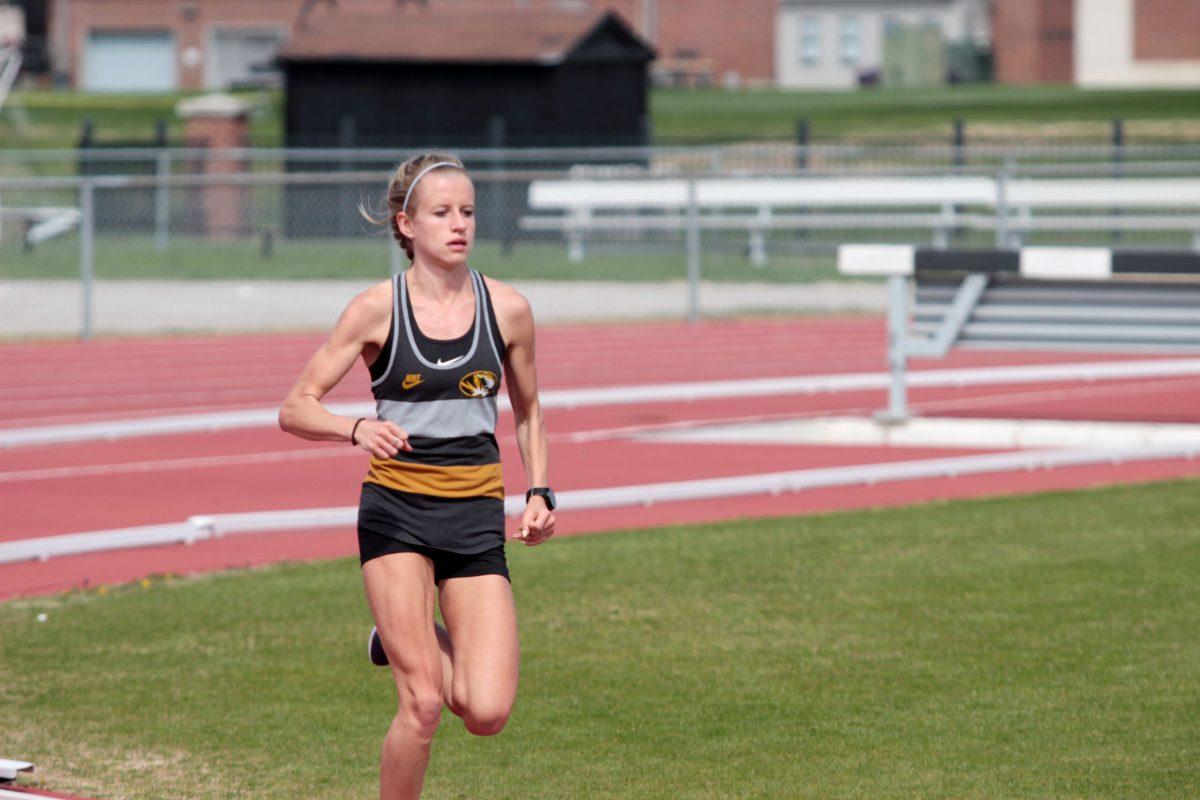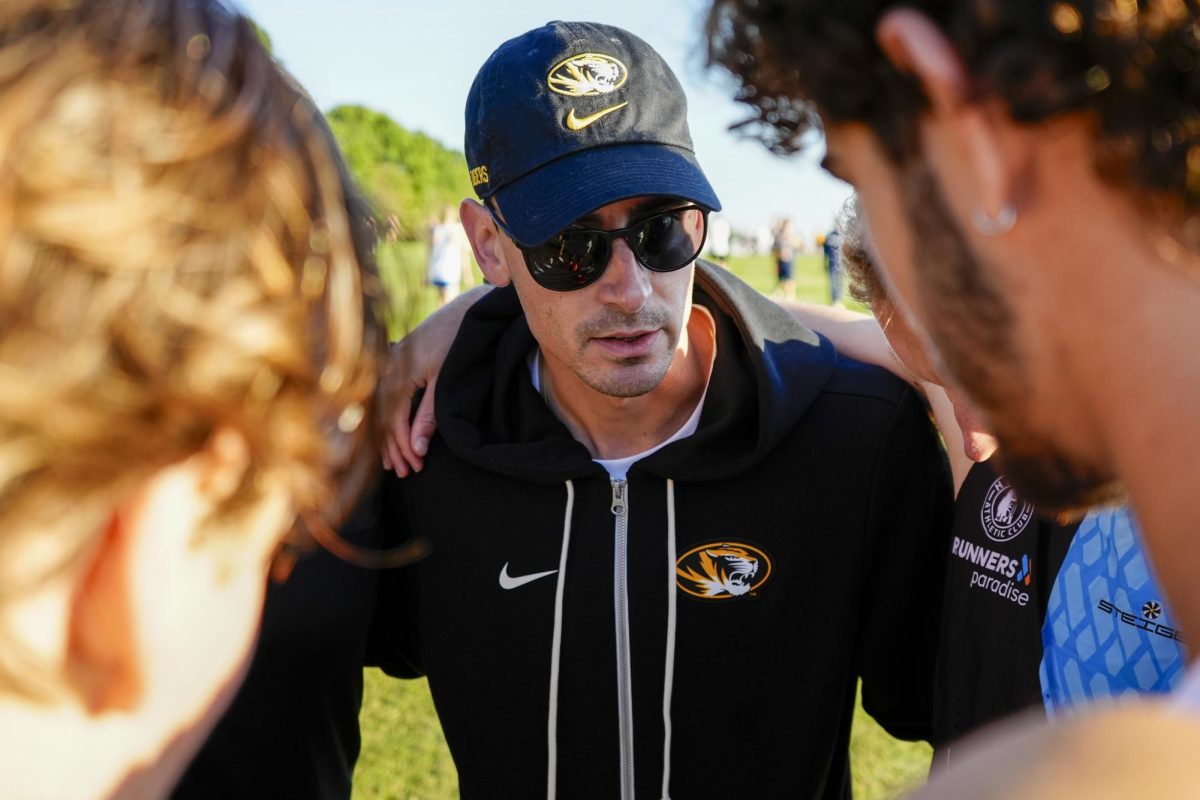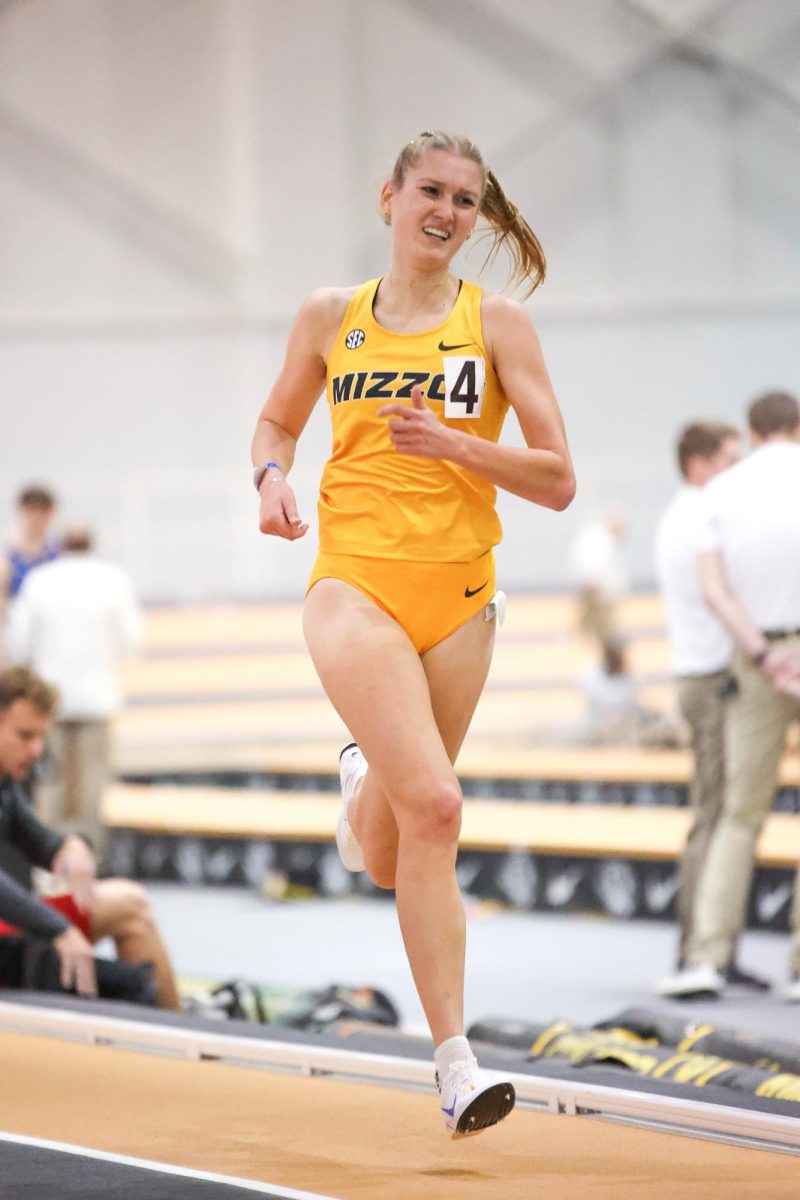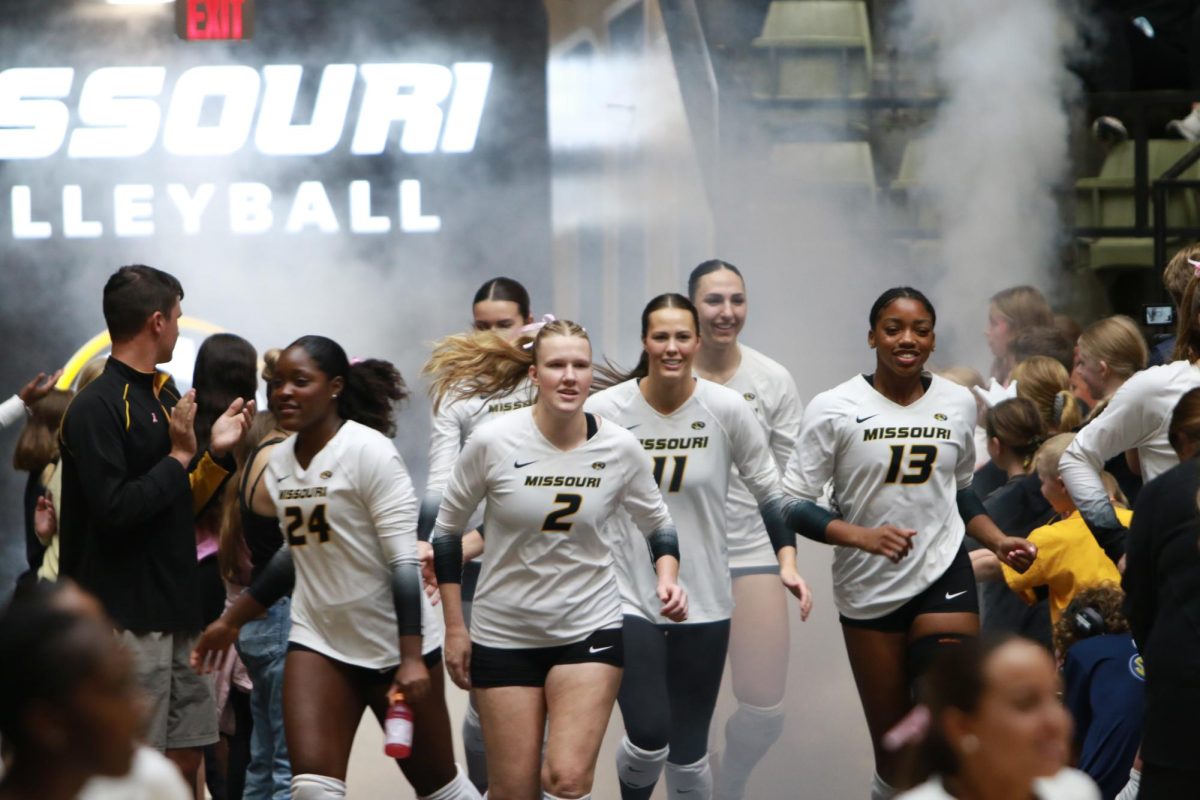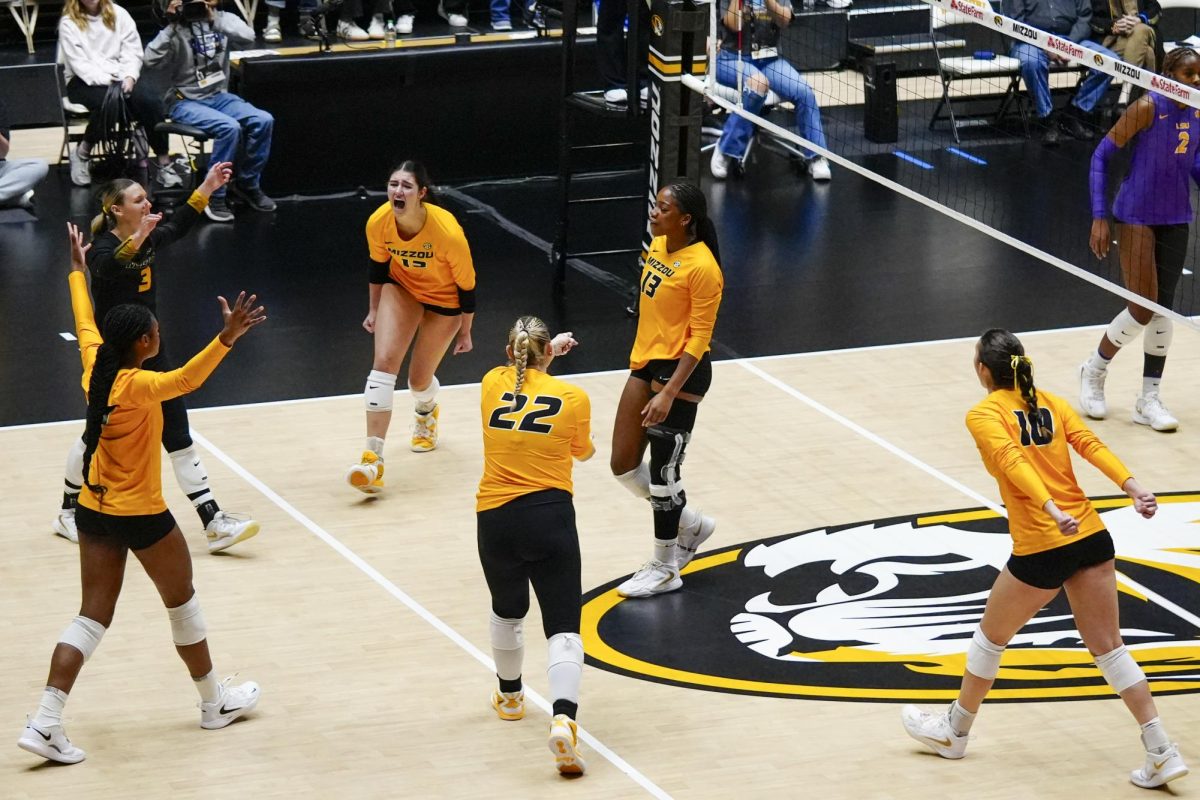On one of the first balmy Friday nights of spring, Karissa Schweizer sped down the straightaway of the track at Audrey J. Walton Stadium.
A flock of fans, each eager for a view, had crept onto the track and was cheering loudly along lanes four through eight, shaking their cowbells and watching the Missouri senior Schweizer glide by with suspense. Others looked on from the stands, while some watched all the way from Taylor Stadium, taking a break from their evening of Missouri baseball to see Schweizer sprint down the home stretch in her final home meet as a Missouri Tiger.
As she left the rest of the field in her wake, the results yielded by that final home meet became clear: Schweizer finished with a school record of 4:12.83 in the 1,500-meter run.
For most athletes, a school record near the end of their senior season would be a high point, a climax to culminate all their years of hard work.
For Schweizer, this was just another night.
Only three weeks earlier, Schweizer recorded another school record, and the NCAAs ninth-fastest time ever, in her collegiate debut in the 10,000 meter run at the Stanford Invitational.
And six days after recording her school record in Columbia, she finished off a dominant month by recording the fourth-fastest time in the world and the fastest time in the NCAA in the 5,000-meter run. She triumphed over the field by more than a full minute.
The two school records this month bring her total to six, the most of any Missouri athlete ever. They occurred after a dominant indoor track season that ended with two national titles, giving her an incredible five for her career. She also tallied eight All-American honors.
Schweizer’s accolades warrant a case for her being the greatest University of Missouri athlete of all time.
But Schweizer isn’t too keen on the honor. Posed with the question, her eyes grew wide as she gazed down at her orange Nikes.
“Uh, I don’t know,” she said, nervously laughing. “That’s not really something I think about. I know that there have been some really good athletes here.”
She referenced three-time wrestling national champ J’den Cox and his 2016 Olympic bronze medal.
“Even being compared to some of those people is an honor in itself.”
At first glance, calling Schweizer a world-class athlete could seem like an unusual claim. She wasn’t a nationally known recruit coming out of high school, and her 5-foot-4 frame isn’t intimidating.
After all, it took a chance encounter at a Subway in Iowa just to set in motion the chain of events that led to Schweizer becoming a Tiger.
##Fate a foot long
Schweizer was a senior at Dowling Catholic High School in Urbandale, Iowa, and on her way home after an eighth-place finish at the Roy Griak Invitational in 2013. She was stopped at a Subway when her father, Mike, bumped into someone. He struck up a conversation with head track coach Brett Halter.
“We were coming back from the race, and my dad is very talkative,” Schweizer said. “So of course he goes up to them and asks them how they did, and we realized it was another school that I could check out. And they kind of told us a little bit about the program, so I went for a visit.”
Schweizer wasn’t even considering Missouri before the conversation, instead focusing on Midwest powers Iowa State, Kansas and Illinois State. But she agreed to visit after recognizing how close campus was to her home in Urbandale.
“We recognized the school and realized it was close to home,” she said, “which was important because I wanted to stay in the Midwest.”
Schweizer visited MU’s campus soon after and was taken in by the atmosphere, so much so that she decided not to take anymore visits. In Columbia, she’d seen all she needed to make up her mind.
“I … just loved it right away,” Schweizer said. “It felt like home to me, and it was a place that I would want to be even if I wasn’t running.”
The Tigers were far from Midwest powerhouses like Iowa State and Kansas. Marc Burns was about to start his first year as head coach, and his job was to transform the cross-country program.
Schweizer was sold on the idea of being one of the first runners to help him do that.
“I thought that was really cool,” she said, “being a part of a program that’s growing and to help the program grow even more.”
Halter had entered Subway for a sandwich. He left with the beginnings of a career of an eventual five-time national champion.
##Unheralded and unheard of
While Schweizer was being recruited, she was told it would be hard for her to break into any team’s top seven runners — the ones who score in cross-country. She had never been an individual state cross-country champion in high school and had claimed just one individual outdoor track title.
But Schweizer’s high school coach Jim Kirby believed she was capable of great things.
Kirby had previously been an assistant coach at Dowling Catholic under Karissa’s grandfather, Frank, and worked alongside Schweizer’s mother, Kathy, before coaching her in high school at Dowling Catholic in Urbandale.
“I knew, with her family,” Kirby said, “she would contribute to our team as soon as she got here.”
Schweizer frequently was told to slow down in workouts under Kirby, who said she came in with a work ethic that was rare for a high school runner.
“She is a charger, she was hungry, almost to a fault in high school,” Kirby said. “She’s very tenacious. She wants to go as fast and hard as she can. I always would have to slow her down and to tell her to run less and to go slower in workouts because she would always want to do more.”
And in her first college season, she proved she could do more. She won SEC Freshman of the Year in an opening campaign that saw her shoot up to the No. 2 spot on the team behind Kaitlyn Fischer.
After running roughly 30 miles a week in high school, Schweizer built up to running 75 miles a week in college. According to a study from Bucknell University, the average American college student walks 26.95 miles per week.
Schweizer slowly closed the gap with Fischer in workouts, and then had a breakout race in the NCAA Midwest Regional, capping her attention-grabbing freshman cross-country season with a spot in the national championships.
She finished that season with All-Midwest honors and went on to finish 155th at the national championships in Terre Haute, Indiana — on the same course where she would win her cross-country national title two years later.
But Schweizer failed to reach the national championships in indoor and outdoor track later that year. Those outcomes marked a wake-up call.
“I kind of got lucky and made it to nationals my freshman year of cross-country,” she said. “It just kind of hit me that it wasn’t always easy like that in track. It was a realization for me that I needed to kind of step up my work ethic. I needed to put more hours into school and into running.”
That work translated to a personal record and second-team All-SEC finish in her sophomore cross-country season. But one thing was missing: She failed to return to the national championships. Even after improvement in her track seasons, she failed to qualify for NCAAs.
##The national breakthrough
Though her career seemed stuck in neutral, Schweizer was recording faster times in more intense workouts. Burns was maintaining his confidence in her, even when her own confidence faded.
“Burns kept telling me, ‘You’re having great workouts, [so] just believe in yourself. If you make it to nationals, something amazing is going to happen,’” Schweizer said. “He kept telling me that, and there were times that I didn’t even believe him.”
By finishing fourth at the NCAA West Regionals in the 5,000-meter run her sophomore year, Schweizer finally earned her chance at the national championships. There, she surprised the crowd at Hayward Field in Eugene, Oregon, with a personal-record time, using her powerful kick to vault herself to a third-place finish.
“That was really my breakthrough moment because I was struggling and didn’t make nationals for a couple seasons,” Schweizer said. “That was a confidence booster for me and just a realization. I do remember crossing the finish line and being like, ‘Oh shoot, you’re never going to get better than that.’”
But Burns saw greener pastures in Schweizer’s future.
“Right away [Burns] was like, ‘OK, time to get that national title,’” she said. “And I’m just like, ‘Aw coach, I got third; that’s good enough.’”
##An unknown champion
Following her sophomore success, Schweizer kick-started her junior season with victories in four of her first five races, including SEC and NCAA Midwest Regional titles. Time went on, her personal records inflating at each and every meet. All the while, she was flying under the national radar.
Entering the National Championships in Terre Haute, no experts expected Schweizer to be a contender. FloTrack projected her to finish sixth. Even Schweizer hadn’t seriously considered the possibility of winning it all. She had just a top-five finish on her mind.
“But at the same time, you can’t do something if you never actually believe in yourself,” Schweizer said. “I’d say one time I was like, ‘Wow, wouldn’t it be crazy if you did win?’ but I really wanted to get in the top five, and I was pretty content with that.”
After the starting gun fired, Schweizer glided through the LaVern Gibson cross-country course, playing catch-up from behind the lead pack for most of the way.
“I was going through the race and I thought, ‘Heck, you could win this thing,’” Schweizer said. “Once that thought even crossed my mind, I was so determined to just catch the next person, catch the next person.”
“Once I was in third, I knew I didn’t want second.”
Schweizer cut the distance little by little before unleashing her kick in the last 1,000 meters. The kick brought her out of nowhere. She flew by the field. Then, all alone at last, she raised both arms in celebration as she crossed the finish line. Then she slowed down, bent over and stood still, awestruck, in silence. A relative unknown coming into the meet, Schweizer had shocked everyone in Terre Haute and come from behind to win the national championship.
“It definitely did not process through my mind,” she said. “I crossed the finish line and I was just in shock, immediately thinking that I was in a dream or something. It was crazy.”
It was her first national title. It wasn’t her last.
##Emerging dominant
Schweizer had little time to rest and celebrate with the indoor track season on the horizon. For her, the first championship was really just the first hurdle.
“That whole track season was more challenging than the cross-country one,” Schweizer said. “Just coming up, being unknown and surprising people is fun, and it’s easy to run that way.”
Schweizer mounted a winning streak of 10 in finals across cross-country and track. She ran her way to an indoor national championship in the 5,000-meter run. Only a second-place finish in the 3,000 could snap her streak.
She had shown her kick and dominance again on the national stage — and that her championship in Terre Haute was no fluke.
“Running at every race and being known is more difficult,” Schweizer said. “Honestly, I was more in shock after the second national title than the first.”
She then brought her dominance back outdoors, ending her season on Hayward Field.
Returning to the spot where she introduced herself to the national stage, Schweizer improved on her third-place finish from the year before, winning her third national title and completing the distance triple crown.
She then transitioned to the summer, finishing fourth at the USATF national championships, losing to three professional runners and finishing higher than any college competitor.
##A bump in the road
Schweizer was ready for her senior year. She triumphed in four of her five races in her quest to defend the title, including a 20-second thrashing the field in the 2017 NCAA Midwest Regional Championships.
Missouri as a team missed out on a tiebreaker, but Schweizer’s teammates journeyed to watch her in Louisville.
“It really threw me off not having my team there [on the course],” Schweizer said. “It’s not the same if you don’t have them at the starting line and dealing with all the pressure and just having an off race.”
That showed during the race; Schweizer was alone running with a pack of 225 competitors, chilly temperatures and strong winds pushing against her.
“You start running and you realize you aren’t gonna win,” she said, “and when you realize you’re not gonna win it’s like, ‘Oh, if you’re second, no one is gonna be happy with second.’”
Schweizer was disappointed to end her cross-country career without a championship, but she did receive her sixth All-American honor with an 11th-place finish. She said it helped her realize that she performs better as an underdog.
“I just had one bad race,” Schweizer said. “I wanted to prove that I wasn’t done yet.”
##Getting back on top
Schweizer got back on her path to dominance during the 2017-18 track season, registering three school records and ending her year with a championship double. She broke the NCAA indoor 3,000-meter record with an 8:41 race in February.
Schweizer won the 5,000-meter and 3,000-meter races on consecutive days at the NCAA Indoor Track and Field National Championships in College Station, Texas. Her fourth and fifth national titles single handedly led Missouri to a ninth-place finish, while Schweizer surpassed J’den Cox for most individual championships ever by a Missouri athlete.
Now, Schweizer will finish off her career with her senior outdoor track season. She plans to double up in this spring’s national championships by running in the 5,000-meter run and then either the 1,500-meter run or the 10,000-meter run.
Schweizer said she looks forward to finishing strong nationally but also cherishes the last couple of months with her teammates.
“It’s been an awesome ride with all of them,” she said. “I’m going to miss them all. It’s kind of been like a family for me here and just like a home away from home.”
After the season is over, Schweizer will transition to professional running, with her eyes on the Olympics in 2020.
“I hope to [go to the Olympics],” Schweizer said. “I’m looking at that process right now and am hoping to find a good group to start training [with].”
Schweizer’s career has changed the distance running program at Missouri, turning it into a destination for top recruits in the Midwest. Burns said the impact is unmeasurable.
“Around town, at the NCAA level, at the world level, people know us because they know her, five-time NCAA champion,” Burns said. “She’s the poster child for distance running in America up-and-coming. She’s the up-and-coming star.”
_Edited by Joe Noser | [email protected]_


